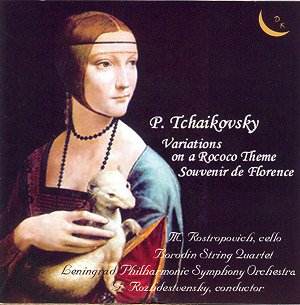This disc contains two major works by Tchaikovsky
for cello and orchestra, and for String Sextet. Due to the lack
of information supplied by CDK I cannot say who is the missing
player from the Souvenir de Florence, nor do I have any recording
information, including playing times. CDK has a fair bit to learn
about CD presentation, but the most important part is the music
being supplied, and I have absolutely no qualms about this. In
the RED Catalogue there is a performance which could be the same
one, recorded in 1980, where the additional soloist is Genrikh
Talalyan. It is on Melodiya – a double album of Tchaikovsky’s
chamber works. I am not sure whether the RCA/Melodiya recordings
are still available, given BMG’s aggressive deletion policy.
This time, unlike the previous disc containing
the two ballet suites, at least the various movements are tracked,
although the Rococo Variations are banded as one. Others in the
current catalogue band each variation separately.
Rostropovich’s interpretation of this piece is
well known, and this version is very true to form. I cannot think
of anyone who would not be enthralled by this performance of the
variations. Rozhdestvensky’s accompaniment with the then Leningrad
Philharmonic Orchestra is first rate. This is not music which
requires a deep interpretation from the orchestra, but it helps
if your soloist is someone having the virtuosity of a Rostropovich.
Tchaikovsky wrote the Rococo Variations for the
St. Petersburg Chamber Music Society, and it was produced in two
forms, one for cello and small orchestra and the second for cello
and piano. This disc has the first of these versions recorded.
It was commissioned by Wilhelm Fitzenhagen, and he edited the
solo part extensively. The premiere was in Moscow in 1877, conducted
by Nikolay Rubinstein.
The Variations were written at about the same
time as Francesca da Rimini. Both these pieces are quite different
in character. Tchaikovsky’s admiration of the Italian Renaissance,
Dante, Mozart and Russian folk music is clear although these ‘voices’
are quite disparate in both works.
The Souvenir de Florence was written for the
St. Petersburg Chamber Music Society, after Tchaikovsky had been
elected an honorary member of the Society, and he had promised
them a composition. He wrote this after completion of The Queen
of Spades, whilst in Florence.
Again the sextet is in two versions, a chamber
orchestra version and the second, for string sextet for two violins,
two violas and two cellos, was completed in 1890. The richness
of this complement gave an almost orchestral richness and was
extremely popular and received many performances in its early
years. The sextet version is the one recorded here.
This performance is superb, with all six instrumentalists
expertly balanced by the recording engineers. These performances
are highly recommended.
John Phillips
